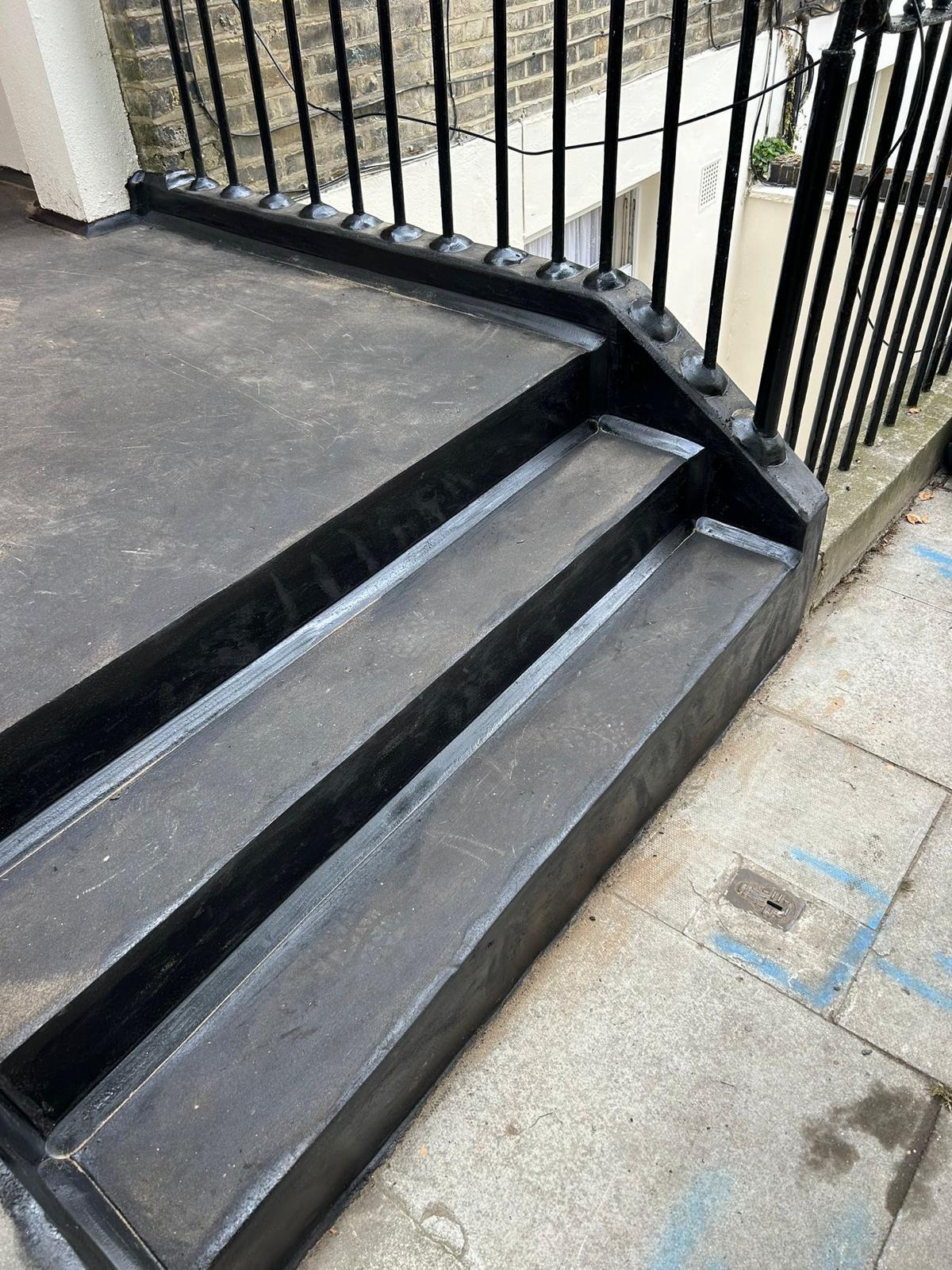If your exterior steps or internal stairways are showing cracks, spalling, or water damage, mastic asphalt for steps and stairs is a proven, long-lasting solution. At Denco Liquid Waterproofing, we install high-quality mastic asphalt finishes that deliver durable, waterproof, and slip-resistant surfaces ideal for both residential and commercial properties.
This guide explains what mastic asphalt is, why it’s a great choice for steps and stairs, the installation process, maintenance tips, expected costs, and answers common questions so you can decide whether it’s right for your project.
What is Mastic Asphalt?
Mastic asphalt is a hot-applied, bituminous material composed of bitumen, mineral fillers, and sand. When heated and applied, it forms a seamless, compacted surface that adheres strongly to substrates like concrete, masonry, or structural steel, making it perfect for steps and stairs where durability and waterproofing are essential.
Why Choose Mastic Asphalt for Steps and Stairs?
- Waterproofing: Mastic creates a continuous, impermeable layer that prevents water ingress protecting underlying structure from freeze-thaw and corrosion.
- Durability: Properly installed mastic can last decades on vertical and horizontal surfaces without cracking or delaminating.
- Slip Resistance: When finished with aggregate or textured top coats, mastic provides excellent anti-slip characteristics improving safety on steps.
- Seamless Finish: No joints or seams means fewer weak points and easier maintenance.
- Versatility: Suitable for exterior steps, internal stair landings, balconies with steps, and commercial staircases.
Typical Applications
- External residential steps and porches
- Commercial building stairwells and landings
- Heritage building step restoration
- Fire escape steps (where appropriate to spec)
- Steps leading to balconies and terraces
The Installation Process (What to Expect)
- Assessment & Preparation: Remove loose material, clean substrate, repair structural cracks, and ensure sound, dry surfaces.
- Primer/Application Bonding: Apply a suitable primer or tack coat to improve adhesion.
- Hot Application: Heat mastic to working temperature and apply in layers; compact while still hot for a dense, impermeable finish.
- Textured Top Layer: If required, broadcast fine aggregate into the surface for grip or apply a non-slip top coat.
- Curing & Inspection: Allow to cool and cure; final inspection for finish and drainage.
Tip: Proper substrate preparation is critical. Skipping repairs or priming reduces lifespan and performance.
Maintenance & Longevity
- Routine checks: Inspect steps seasonally for surface wear, pooling water, or damage.
- Cleaning: Sweep or rinse to remove grit and leaves; avoid pressure-washing at close range.
- Repairs: Small chips or worn patches can be patched by a professional. Major deterioration may require resurfacing.
- Lifespan: With correct installation and maintenance, expect 15–30+ years depending on exposure and load.
Cost Considerations
Costs depend on:
- Size and number of steps
- Complexity and height of stair runs
- Condition of the existing substrate (repair needs)
- Accessibility and site preparation
- Required slip-resistive finish
Provide rough budget ranges (local variations apply): small residential porch steps often start at modest costs, while large commercial stair projects require a site survey and detailed quote. Contact Denco Liquid Waterproofing for a tailored estimate.
Health, Safety & Regulations
- Mastic asphalt is applied hot experienced installers use proper PPE and follow hot-work safety protocols.
- For public and commercial steps, ensure the finished surface meets local building codes and slip-resistance standards.
- Fire ratings and building regulations vary by application; we’ll advise compliance at survey stage.
Is Mastic Asphalt Better Than Alternatives?
- Concrete overlays: cheaper short-term but may crack and need rework.
- Paving stone or tiles: aesthetic options but have joints and can be slippery when wet.
- Rubber treads: good for anti-slip but less durable long-term in heavy traffic.
Mastic asphalt balances durability, waterproofing, and seamless safety, making it an excellent long-term investment for many stair projects.
Frequently Asked Questions (FAQ)
Q: Can mastic asphalt be applied to internal stairs?
A: Yes especially in basements or areas needing waterproofing. Ventilation is needed during installation.
Q: How long after installation can stairs be used?
A: Once cooled and set typically the same day for light foot traffic, but allow recommended curing time for heavy loads.
Q: Will mastic asphalt crack in cold climates?
A: Properly mixed and compacted mastic designed for the climate resists freeze-thaw damage better than many alternatives.
Q: Can it be painted or coloured?
A: Yes with compatible coatings or pigmented top layers, though colouring may affect slip properties.
Q: How do you clean mastic asphalt steps?
A: Sweep regularly and rinse with water; avoid harsh solvents. For stubborn stains, consult a professional.
Call to Action
Ready to protect and upgrade your steps? Denco Liquid Waterproofing offers professional surveys, clear quotes, and certified installation of mastic asphalt for steps and stairs.
Get a free site survey and quote today contact Denco Liquid Waterproofing and make your steps safer and longer-lasting.
